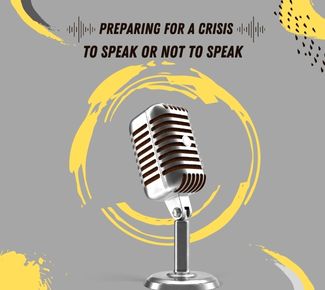Preparing for a crisis: to speak or not to speak

I have seen it far too many times. During a public relations crisis, organizations will pull the covers over their head and hope it all goes away if they are just really, really quiet.
Meanwhile, the cold wind of the internet/social media keeps blowing, and their minor burn starts burning out of control. Soon they have a full-on raging wildfire. Don’t get me wrong–I don’t believe in organizations' senseless responses. But instead, I recommend strategically responding to a crisis.
How do you do that? Think of consistent feeding. Think of the media and the public’s figurative appetite as your literal appetite. What’s better, feeding yourself after you’ve passed the mark of hangry or providing sustenance in small amounts over a while to keep the stress of hunger at bay?
Here are a few strategies to consider:
What do you know, and what can you tell?
The press won’t go away, so what can you confidently give them to satisfy their hunger for information? “No comment” is not enough.
Transparency.
Even if you are not able to say much, saying something acknowledges the desire for information and prevents the optics you are hiding or avoiding. So yes, they CAN handle the truth. Even if it’s, “We are evaluating the series of events and will have a response as soon as we have thoroughly and properly investigated the matter.” Or, “We are committed to transparency and are working to gather as much information as possible to inform our team members, customers, and public on the next steps.” The fundamental strategy here is follow-up. Follow-up with new information consistently.
The person at the top must make themselves available.
Spokespeople are extraordinary and skilled in responding to the public, but your communications team should coach your leadership to respond in a crisis. This builds confidence and trust and exemplifies your commitment to transparency.
Practice, practice, practice.
Leadership should be in the habit of practicing how to respond to any number of crisis scenarios with their communication teams. As the kids say, “stay ready, so you don’t have to get ready. “
After over two decades as a former broadcast journalist, I know one thing–you can’t avoid responding. Delaying it may make it harder. Strategy, thoughtfulness, and looking at your response through the lens of the public will prevent a bad situation from worsening.
Questions or comments for Regina?
Reach out to us.
Are you a subject matter expert?
We bet you are. We'd love to publish your comms-related article. Let us know! We'd love to have you.
